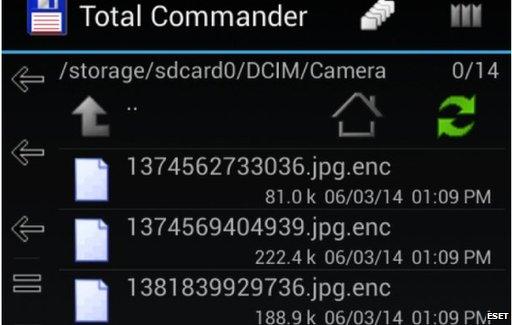Android Simplelocker ransomware encrypts SD card files
- Published

The security firm says the Android-targeting Trojan malware is the first of its kind
A security firm says it has found the first confirmed case of ransomware that encrypts files held by Android devices.
Eset reports that the Trojan, external - called Simplelocker - targets SD cards slotted into tablets and handsets, electronically scrambling certain types of files on them before demanding cash to decrypt the data.
The message is in Russian, and payment is requested in Ukrainian currency.
One expert said the threat was noteworthy, but limited at this stage.
"File-encrypting malware has proved to be a lucrative criminal enterprise so it is unsurprising that Android has become a new target," said Dr Steven Murdoch, of the University of Cambridge's Computer Laboratory.
"Smartphone users should be very cautious of installing software from sources other than the operating system-provided application store, and should pressure their phone supplier to promptly provide security updates to defend against known vulnerabilities."

Infected devices bring up this Russian-language warning
He noted that networks often lagged or failed altogether to provide Google's security patches for older Android handsets.
Porn alert
Slovakia-based Eset said affected device owners were presented with a message saying that their phone was locked because they had viewed and distributed "child pornography , zoophilia and other perversions".
It goes on to instruct the victims to pay 260 hryvnias ($22, £13) via the Ukrainian MoneXy cash transfer system.
"After payment your device will be unlocked within 24 hours. In case of no PAYMENT YOU WILL LOSE ALL DATA ON your device!" it added.
The security firm said that the types of files that could be encrypted included jpeg and gif images, dox and txt text files, and mkv, avi and mp4 media.
It added that information about the infected device would also be uploaded to the server computer used by the cyber-thieves, potentially to help them ensure the right data was decrypted when a payment was received.
This server was hosted on a hidden part of the internet called Tor, Eset added, making the scam hard to trace.
"Our analysis... revealed that we are most likely dealing with a proof-of-concept or a work in progress - for example, the implementation of the encryption doesn't come close to 'the infamous Cryptolocker' on Windows," wrote security researcher Robert Lipovsky.
"Nevertheless, the malware is fully capable of encrypting the user's files, which may be lost if the encryption key is not retrieved.

The Trojan encrypts files stored on an SD card installed in an Android device
"While the malware does contain functionality to decrypt the files, we strongly recommend against paying up - not only because that will only motivate other malware authors to continue these kinds of filthy operations, but also because there is no guarantee that the crook will keep their part of the deal and actually decrypt them."
Although this is the first reported instance of Android ransomware encrypting files, there have been other types.
Last month a security researcher known as Kafeine reported about a variant, external that prevented Android apps from launching, effectively making infected devices useless, unless a $300 payment was made.
Before that, the security firm Symantec reported about an app, external that caused pop-up warnings to repeatedly appear, which could not easily be closed unless a fee was paid.
- Published2 June 2014

- Published24 December 2013

- Published13 December 2013
